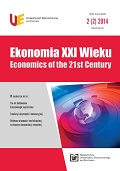Mobilność kapitału ludzkiego jako źródło międzynarodowej i wewnątrzkrajowej dyfuzji wiedzy
Human capital mobility as a source of international and intranational knowledge diffusion
Author(s): Małgorzata WachowskaSubject(s): Economy
Published by: Wydawnictwo Uniwersytetu Ekonomicznego we Wrocławiu
Keywords: knowledge diffusion; academic researcher mobility; skilled staff mobility
Summary/Abstract: It is believed that human capital mobility is essential for both intranational as well as international knowledge diffusion and consequently for the improvement of innovativeness and competitiveness of enterprises and national economies. The common opinion, however, is that it is only the receiving party who benefits in the form of spillover effects while the source company or country of the worker lose (or do not gain) as a result of his departure or emigration. Because of this, policy makers in many countries, and not only those with developing or emerging economies, fear that activities of mobile academic researchers or skilled industry staff will positively affect only the host country despite the fact that the worker have been largely financed by the source country. In the light of ongoing discussion concerning potentially negative consequences of human capital mobility for the parent party, the aim of this article is to show, on the example of selected national economies, the relationship between human capital mobility and knowledge diffusion as well as identify the factors that stimulate and inhibit knowledge diffusion through labour mobility. On the basis of empirical research findings it may be stated that there is no support for the widespread concern that only the party which receives human capital gains its precious know-how. Namely, regardless of the knowledge diffusion measurement method used (method in which the measure is certain economic indicator; citation method, survey study method), evidence can be found that both mobile academic researchers as well as skilled industry workers transfer knowledge also to the source company and country. Moreover, these effects are noticeable in both developed as well as emerging and developing economies. The diffusion of knowledge, however, does not always occur or the strength of the diffusion may vary, in both the parent party as well as the party hiring the worker. The role of human capital mobility in transfer of knowledge depends on a number of factors. Diffusion of knowledge is fostered by (1) existence of a technological gap between the source party and the party which hires the worker, yet this gap cannot be too large; (2) high ability of the hiring party to absorb foreign know-how; (3) patent system with poor protection of intellectual property rights; (4) the mobile worker having knowledge ”distant” from the one possessed by the hiring party and (5) employment of the mobile worker in non-core technological areas of her or his new employer. The barriers to diffusion of knowledge are (1) high propensity to patent innovation at the company from which the worker departs; (2) using of hard intellectual property rights protection strategy by the company from which the worker departs; (3) using of high wage strategy by the company and (4) the company using a strategy consisting in relaying knowledge to employees only by their supervisors and not through technical instructions, service manual
Journal: Ekonomia XXI Wieku
- Issue Year: 2014
- Issue No: 02
- Page Range: 80-92
- Page Count: 13
- Language: Polish

